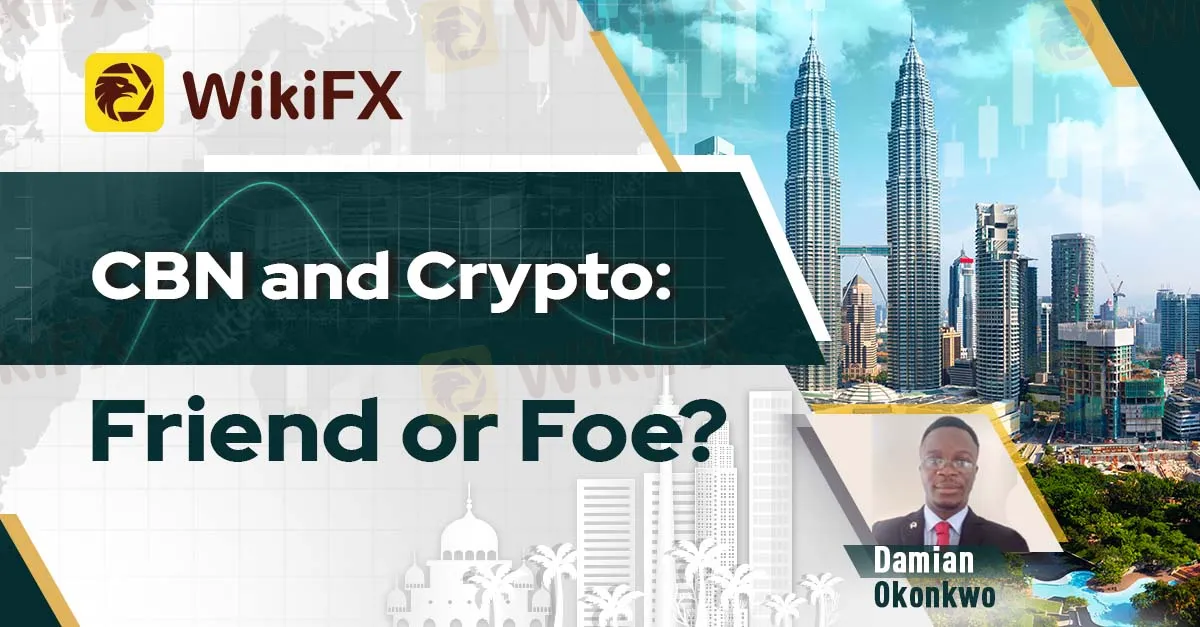简体中文
繁體中文
English
Pусский
日本語
ภาษาไทย
Tiếng Việt
Bahasa Indonesia
Español
हिन्दी
Filippiiniläinen
Français
Deutsch
Português
Türkçe
한국어
العربية
CBN and Crypto: Friend or Foe?
Abstract:In a country plagued by economic instability and currency devaluation, crypto offers a glimmer of hope – a gateway to a borderless, decentralized monetary system.

By: Damian Okonkwo

Understanding the Regulatory Landscape for Crypto Trading in Nigeria Today
The Central Bank of Nigeria (CBN) has long taken a frosty stance towards crypto trading within the country; leaving Nigerians to grapple with a confusing and often contradictory regulatory landscape.
In February 2021, the CBN dealt a crippling blow to the budding crypto ecosystem with a circular banning all financial institutions from facilitating cryptocurrency transactions. Overnight, exchanges were shut down, accounts frozen, and dreams of financial inclusivity dashed. The move sent shockwaves through the tech community and sparked widespread criticism. Critics argued that the ban stifled innovation, hampered financial freedom, and pushed Nigerians towards unregulated, informal crypto markets.
However, a ray of light emerged in December 2023 when the CBN lifted the ban, seemingly acknowledging the futility of trying to suppress a global phenomenon. While this move was met with cautious optimism, the regulatory landscape surrounding crypto in Nigeria remains opaque and riddled with uncertainties.
Currently, there exists no clear-cut legal framework for cryptocurrencies. The Securities and Exchange Commission (SEC) has attempted to fill the void by issuing Guidelines on Digital Assets Offering Platforms (DAOPs) in May 2023. These guidelines attempt to regulate cryptocurrency exchanges and initial coin offerings (ICOs), but their scope and effectiveness remain a point of contention.
The CBN, meanwhile, seems to be adopting a “cautious engagement” approach. Recent pronouncements indicate an openness to explore the potential of blockchain technology while simultaneously guarding against financial instability and money laundering. This delicate balancing act leaves many unanswered questions.
So Is the CBN a friend or foe to Crypto trading in Nigeria today?
The answer, for now, remains a tantalizingly ambiguous “it's complicated.” But the journey towards a clear and mutually beneficial relationship has just begun. As Nigerians navigate the murky waters of this evolving landscape, one thing is certain: the potential of crypto to reshape the country's financial future is too compelling to ignore.
Conclusion
The path forward for crypto in Nigeria hinges on achieving a regulatory sweet spot. A framework that fosters innovation while protecting consumers and mitigating systemic risks is critical. This requires collaboration between the CBN, SEC, other relevant stakeholders, and the crypto community itself.
Open dialogue, transparent policies, and a willingness to learn from other jurisdictions are key to addressing the issues bordering on crypto trading within the region. Nigeria has the potential to become a regional leader in blockchain technology and crypto adoption. Embracing regulation, rather than fearing it, can unlock this potential and pave the way for a future where crypto empowers, rather than hinders, financial inclusion in Nigeria.

Disclaimer:
The views in this article only represent the author's personal views, and do not constitute investment advice on this platform. This platform does not guarantee the accuracy, completeness and timeliness of the information in the article, and will not be liable for any loss caused by the use of or reliance on the information in the article.
Read more

Trade FX-Limited - Scams & Lack of Withdrawals are Normal Here!
Trade FX-Limited adds to the list of forex brokers whose investors have been fed up with a lack of withdrawals, leading to scams later. Check out what customers are saying about this forex broker.

10 Signs of a Fake Forex Trading or Crypto Website
Been to a forex trading or crypto website promising guaranteed returns, displaying too good to be true testimonials and far too many impressive features? Beware, it's a SCAM! In this article, we discuss 10 signs of a fake forex trading or cryptocurrency website.

Know the Red Flags before Investing in Primarkets
Knowing the red flags of FX Broker is the most important act while you are thinking to invest your money in the Forex market and are enthusiastic about Forex trading.

What is Forex Trading Simulator?
A Forex trading simulator is a tool that allows traders to practice trading in real market conditions without risking real money. Simulators help traders gain experience, develop skills, and build confidence before they begin live trading.
WikiFX Broker
Latest News
Top Wall Street analysts are upbeat about these dividend-paying stocks
Singapore's economy grows 4.3% in second quarter, beating expectations
In middle of Trump's trade war, importers hold more cash and move inventory off the books
Asia-Pacific markets trade mixed as investors assess Trump's latest tariff threats; bitcoin hits new highs
Gold Soars Above $3,350 as XAU/USD Rallies on Trade Tensions
What WikiFX Found When It Looked Into Emar Markets
Short or Long Term: Which to Choose for Double-Digit Returns from Gold Investments?
What is Forex Trading Simulator?
MT4 vs MT5 Which Forex Trading Platform Fits Your Needs in 2025?
Stock futures slide on more Trump tariff letters, but are off worst levels of session: Live updates
Currency Calculator


